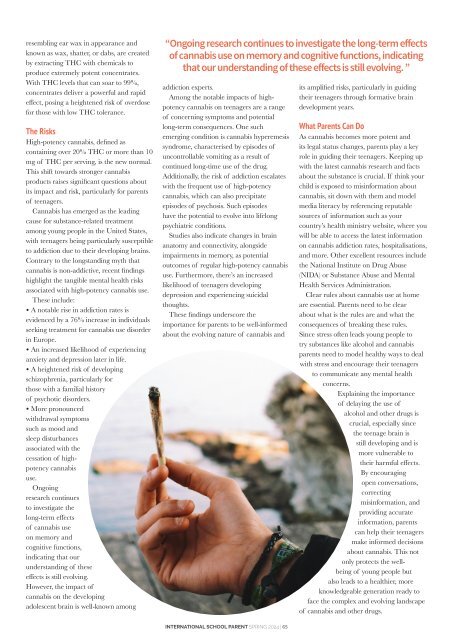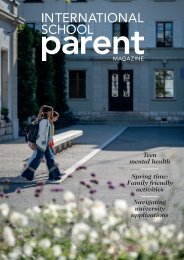International School Parent Magazine - Spring 2024
Welcome to the first edition of the International School Parent Magazine for 2024. We hope that you enjoy reading it as much as we enjoyed putting it together. Spring is a wonderful time – the weather is warmer, and the longer days help to boost our motivation. It is also the perfect time to start thinking about summer camps. We have curated a list of inspiring and interesting programmes and have presented them to you in a special feature beginning on page 40. In this edition we had the pleasure of interviewing both Nicola Sparrow, School Director of Aiglon College, and Andrea Spielmann, the Principal of the new SIS Basel-Allschwil school. In these articles, both these accomplished women share their passion for education and provide insight into the culture and ethos of their respective schools. We also continue our discussion of children’s mental health, drug use, communication, travel, and present many more interesting and topical articles and commentary. Check out the articles about the family activities in Lichtenstein, as well as unusual and exciting things to do in Switzerland, and an introduction to Basel the Swiss capital of culture and architecture. Once again, we are thrilled to present to you a magazine filled with interesting and informative articles, exciting experiences, and practical tips for parents. Have a wonderful spring and we look forward to bringing you more content again in summer.
Welcome to the first edition of the International School Parent Magazine for 2024. We hope that you enjoy reading it as much as we enjoyed putting it together.
Spring is a wonderful time – the weather is warmer, and the longer days help to boost our motivation. It is also the perfect time to start thinking about summer camps. We have curated a list of inspiring and interesting programmes and have presented them to you in a special feature beginning on page 40.
In this edition we had the pleasure of interviewing both Nicola Sparrow, School Director of Aiglon College, and Andrea Spielmann, the Principal of the new SIS Basel-Allschwil school. In these articles, both these accomplished women share their passion for education and provide insight into the culture and ethos of their respective schools.
We also continue our discussion of children’s mental health, drug use, communication, travel, and present many more interesting and topical articles and commentary.
Check out the articles about the family activities in Lichtenstein, as well as unusual and exciting things to do in Switzerland, and an introduction to Basel the Swiss capital of culture and architecture.
Once again, we are thrilled to present to you a magazine filled with interesting and informative articles, exciting experiences, and practical tips for parents. Have a wonderful spring and we look forward to bringing you more content again in summer.
You also want an ePaper? Increase the reach of your titles
YUMPU automatically turns print PDFs into web optimized ePapers that Google loves.
esembling ear wax in appearance and<br />
known as wax, shatter, or dabs, are created<br />
by extracting THC with chemicals to<br />
produce extremely potent concentrates.<br />
With THC levels that can soar to 99%,<br />
concentrates deliver a powerful and rapid<br />
effect, posing a heightened risk of overdose<br />
for those with low THC tolerance.<br />
The Risks<br />
High-potency cannabis, defined as<br />
containing over 20% THC or more than 10<br />
mg of THC per serving, is the new normal.<br />
This shift towards stronger cannabis<br />
products raises significant questions about<br />
its impact and risk, particularly for parents<br />
of teenagers.<br />
Cannabis has emerged as the leading<br />
cause for substance-related treatment<br />
among young people in the United States,<br />
with teenagers being particularly susceptible<br />
to addiction due to their developing brains.<br />
Contrary to the longstanding myth that<br />
cannabis is non-addictive, recent findings<br />
highlight the tangible mental health risks<br />
associated with high-potency cannabis use.<br />
These include:<br />
• A notable rise in addiction rates is<br />
evidenced by a 76% increase in individuals<br />
seeking treatment for cannabis use disorder<br />
in Europe.<br />
• An increased likelihood of experiencing<br />
anxiety and depression later in life.<br />
• A heightened risk of developing<br />
schizophrenia, particularly for<br />
those with a familial history<br />
of psychotic disorders.<br />
• More pronounced<br />
withdrawal symptoms<br />
such as mood and<br />
sleep disturbances<br />
associated with the<br />
cessation of highpotency<br />
cannabis<br />
use.<br />
Ongoing<br />
research continues<br />
to investigate the<br />
long-term effects<br />
of cannabis use<br />
on memory and<br />
cognitive functions,<br />
indicating that our<br />
understanding of these<br />
effects is still evolving.<br />
However, the impact of<br />
cannabis on the developing<br />
adolescent brain is well-known among<br />
“Ongoing research continues to investigate the long-term effects<br />
of cannabis use on memory and cognitive functions, indicating<br />
that our understanding of these effects is still evolving. ”<br />
addiction experts.<br />
Among the notable impacts of highpotency<br />
cannabis on teenagers are a range<br />
of concerning symptoms and potential<br />
long-term consequences. One such<br />
emerging condition is cannabis hyperemesis<br />
syndrome, characterised by episodes of<br />
uncontrollable vomiting as a result of<br />
continued long-time use of the drug.<br />
Additionally, the risk of addiction escalates<br />
with the frequent use of high-potency<br />
cannabis, which can also precipitate<br />
episodes of psychosis. Such episodes<br />
have the potential to evolve into lifelong<br />
psychiatric conditions.<br />
Studies also indicate changes in brain<br />
anatomy and connectivity, alongside<br />
impairments in memory, as potential<br />
outcomes of regular high-potency cannabis<br />
use. Furthermore, there’s an increased<br />
likelihood of teenagers developing<br />
depression and experiencing suicidal<br />
thoughts.<br />
These findings underscore the<br />
importance for parents to be well-informed<br />
about the evolving nature of cannabis and<br />
its amplified risks, particularly in guiding<br />
their teenagers through formative brain<br />
development years.<br />
What <strong>Parent</strong>s Can Do<br />
As cannabis becomes more potent and<br />
its legal status changes, parents play a key<br />
role in guiding their teenagers. Keeping up<br />
with the latest cannabis research and facts<br />
about the substance is crucial. If think your<br />
child is exposed to misinformation about<br />
cannabis, sit down with them and model<br />
media literacy by referencing reputable<br />
sources of information such as your<br />
country’s health ministry website, where you<br />
will be able to access the latest information<br />
on cannabis addiction rates, hospitalisations,<br />
and more. Other excellent resources include<br />
the National Institute on Drug Abuse<br />
(NIDA) or Substance Abuse and Mental<br />
Health Services Administration.<br />
Clear rules about cannabis use at home<br />
are essential. <strong>Parent</strong>s need to be clear<br />
about what is the rules are and what the<br />
consequences of breaking these rules.<br />
Since stress often leads young people to<br />
try substances like alcohol and cannabis<br />
parents need to model healthy ways to deal<br />
with stress and encourage their teenagers<br />
to communicate any mental health<br />
concerns.<br />
Explaining the importance<br />
of delaying the use of<br />
alcohol and other drugs is<br />
crucial, especially since<br />
the teenage brain is<br />
still developing and is<br />
more vulnerable to<br />
their harmful effects.<br />
By encouraging<br />
open conversations,<br />
correcting<br />
misinformation, and<br />
providing accurate<br />
information, parents<br />
can help their teenagers<br />
make informed decisions<br />
about cannabis. This not<br />
only protects the wellbeing<br />
of young people but<br />
also leads to a healthier, more<br />
knowledgeable generation ready to<br />
face the complex and evolving landscape<br />
of cannabis and other drugs.<br />
INTERNATIONAL SCHOOL PARENT SPRING <strong>2024</strong> | 65














